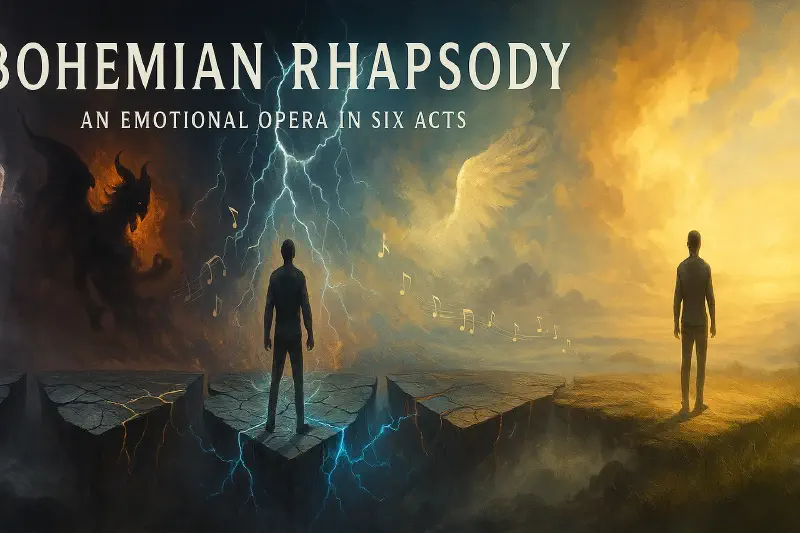You ever hear a song that feels like it’s rolling out an entire lifetime of feelings in just six minutes? For more than forty years, Queen’s “Bohemian Rhapsody” has been that song—the one that gets us singing, but also quietly wondering: What is this actually about?
Let’s take a walk through this operatic rollercoaster—not as a music theory deep dive, but as a story of being human when life corners you, and your own mind becomes both judge and jury.
The Opening: Shock and Denial (“Is this the real life?”)
Do you remember that feeling when something truly shocking happens? Time slows. Things blur. You might even wonder, “Is this actually happening?”
That’s where it starts:
Is this the real life? Is this just fantasy?
Caught in a landslide, no escape from reality
Right away, we’re in the head of someone who’s just been hit by something big. Shock. Disbelief. He tries to play it off: “Easy come, easy go, any way the wind blows…” But let’s be honest—that’s not zen; it’s a shield. A mental trick. Pretend you don’t care, maybe it’ll hurt less.
Confession & Fear: Dropping the Mask (“Mama, just killed a man”)
But the mask slips fast. We crash into the confession:
Mama, just killed a man / Put a gun against his head, pulled my trigger, now he’s dead
Whether you take this literally or as a metaphor for some huge mistake, the point is: the truth is out. The character turns to his mother—“Mama”—the universal stand-in for comfort, morality, the person who holds us when we’re scared or guilty.
Now, the fear and shame flood in:
If I’m not back again this time tomorrow / Carry on, carry on as if nothing really matters
He’s not fooling anyone, least of all himself. Underneath that “any way the wind blows” attitude, he’s drowning in regret.
Facing Mortality: The Dread Kicks In
The next verse is where those consequences land—hard.
Too late, my time has come / Sends shivers down my spine, body’s aching all the time
This is the moment you realize: there’s no undoing what’s done. He’s terrified of what’s next. He tries to say goodbye, but there’s no comfort in it. The dread is physical—aching, shivering, wishing he could just disappear:
I don’t wanna die / I sometimes wish I’d never been born at all
The Inner Trial: The Opera in the Mind
And then—the famous opera section. Now, things get wild. Voices. Arguments. Lightning bolts. It’s like his mind has split into a whole cast of characters:
- Self-pity: “I’m just a poor boy, nobody loves me.”
- Judgment: “Will you let me go? Bismillah! No, we will not let you go!”
- Desperation: “Let me go!”
Sound familiar? That inner back-and-forth when you’re stuck between regret and hope, fear and fight. It’s not just drama—it’s a psychological trial. Your conscience, your shame, your hope, all fighting it out in your head.
Even when he wants to give up, something refuses to let him. There’s still a tiny spark—maybe it’s hope, maybe just stubbornness.
And then comes the shadow: “Beelzebub has a devil put aside for me, for me, for me…” That’s the dark voice, the urge to strike back, to not go down quietly.
Rebellion: The Comeback Surge
After all that, the music explodes. The character surges up in defiance:
So you think you can stone me and spit in my eye? / So you think you can love me and leave me to die?
It’s the fight-back. The “I’m not finished yet!” moment. Maybe you’ve felt that too—after a long low, suddenly your heart catches fire and you want to shout, “You can’t do this to me!”
But as fast as it comes, the fire burns out.
Dissolution: Acceptance, or Just Letting Go?
And then—quiet. The music, the drama, the storms, all settle. We’re left with the refrain:
Nothing really matters, anyone can see
Nothing really matters to me
Any way the wind blows
But here’s the twist: this isn’t the fake “whatever” from the start. It’s not bravado now. It’s a surrender, maybe acceptance. The storm has passed, and what’s left is… nothing really matters. Sometimes this is peace. Sometimes it’s just emptiness. But it’s honest.
Why This Resonates: The Universal Human Opera
If you’ve ever been through something that flipped your world upside down—grief, guilt, heartbreak—you know this cycle. Denial. Confession. Dread. Inner trial. Fight. Surrender.
“Bohemian Rhapsody” isn’t just a song. It’s the emotional journey of a person cornered by life itself. It doesn’t offer easy answers. It doesn’t tell you how to fix anything. It just is—letting all the messy, contradictory feelings play out, and then sitting with whatever’s left.
That’s why it feels so real. Because sometimes, the bravest thing is to let the wind blow—and see where you land.
(Written by Human, improved using AI where applicable.)
